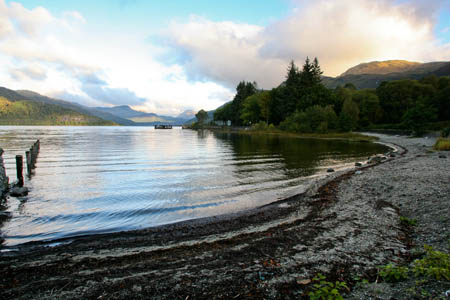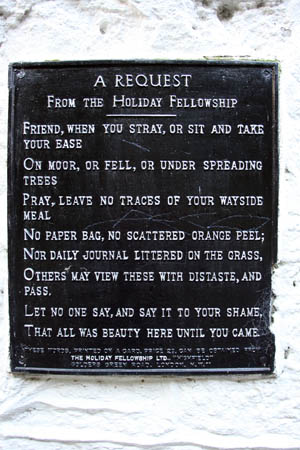
Wild camping at sites such as this at Rowardennan will be illegal if the bylaw is introduced
Walkers on the West Highland Way could be banned from wild camping on a 17km stretch of the route alongside Loch Lomond.
Loch Lomond & the Trossachs National Park Authority this week launched a 12-week consultation on plans to introduce bylaws that would make it illegal to camp outside designated sites between Drymen and Ptarmigan Lodge, north of Rowardennan. The authority says the proposal is in response to growing antisocial behaviour in the area.
The area in question covers 14 sq km and takes in some of the most popular sites on the eastern side of the loch, including Balmaha, Sallochy Bay, Millarochy and Rowardennan.
The national park says the measures are necessary to protect the beauty spots from irresponsible camping and the damage and disruption it causes. The bylaw would make it an offence to pitch a tent or set up any form of shelter including overnight sleeping in vehicles.
Although aimed at unruly elements that have caused major disruption in the area, the ban could have serious implications for walkers backpacking the 154km (96-mile) West Highland Way, the most popular long-distance trail in Scotland.
Camping would still be allowed on commercial sites such as those at Cashel and Millarochy, which both stand to benefit from the introduction of the new bylaw.
The authority says local residents support the camping ban.
Fiona Logan, the park’s chief executive, said: “This is undoubtedly some of the most beautiful scenery in Scotland and some of the most well known. We have amazing views along the banks of Loch Lomond but unfortunately, if you take a closer look on a busy summer weekend, you’ll find the remains of tents, burnt down trees, abandoned campfires and countless bags of rubbish.
“The huge popularity and sheer numbers of people are slowly degrading Loch Lomondside and we have to propose innovative ways to try and save the landscape around us. Most of the issues we face are related to informal camping and we have to look at taking action before the environment so many people enjoy is destroyed forever.

Sadly, not all campers follow this invocation at Rowardennan
“The incidents on the east side of the loch that include drunkenness, vandalism and criminal damage, have meant that the local communities, the national park authority and its partners are looking at some innovative measures to deal with issues to try and protect the environment and allow people to have a more enjoyable visit.
“Our role is to support our communities and to ensure that everyone coming to the national park has a great experience of this precious place.”
The proposed ban follows Operation Ironworks, collaboration between Central Scotland Police, the park authority and Forestry Commission Scotland. Ms Logan said: “Ironworks has been a fantastic success and has seen our rangers working with Central Scotland Police to carry out joint patrols across the national park.
“We appointed a national park police officer to ensure effective joint working across the park between our communities, the police and our rangers. In a UK first, some of our rangers became employee-supported special constables.
“We now need to look at preventative measures as well as enforcement and this is why we have launched the camping byelaws consultation.”
Kevin Lilburn, director of the Buchanan Community Partnership and local resident, added: “The local community fully supports the introduction of the new bylaws. After many years of locals having to deal with the challenging issues associated with informal camping, we are delighted that the national park is taking positive action to improve the management of visitors to this iconic and beautiful area.”
The Land Reform (Scotland) Act gives the right to camp in the Scottish countryside but the right must be exercised responsibly. Any illegal actions lead to the forfeit of rights.
The full consultation document can be seen online.
Representations can also be made to the national park authority online.
dougy crichton
10 February 2010comments on Your this article...i think this is a poor decision walkers and normal folk alike will suffer
Dave
11 February 2010I think its a shame that this action has to be taken, however I fully understand the rational behind it.
I have enjoyed this special part of our nation on numerous occasions for over 33yrs, and can bare witness to the gradual errosion of the moral and ethical codes that guided and maintain the respect for this special place.
Have people changed that much? or is the problem related to the upwardly mobile generation who care not for the countryside, rather they seek to escape the attention of police, to allow them to behave in ways that would not be acceptable in their own communitys.
Shame on you!!!!
Dougie
12 February 2010"The national park authority and its partners are looking at some innovative measures to deal with issues"
Proposing a by-law to completely ban all wild camping in this area is not an "innovative measure" but is, rather, a draconian response to the NPA and local police/official's failure to clamp down on troublemakers. The West Highland Way is one of the oldest and most famous long distance routes in Britain, and this proposal will discourage genuine walkers from doing the route, to the detriment of the local communities they visit to rest and take on supplies. The people who are causing damage, leaving litter, building fires etc. have no respect for the local environment, communities, or the law, and will continue to be a problem if the policing of the area remains inadequate. The only people to suffer will be the decent, law abiding West Highland Wayers, who will be unsure of where they can and cannot camp, and may have their trip ruined because of the actions of a minority of idiots.
TREV
08 March 2010i am British and currently living in germany and i am amazed at how the british people treat their own back yard.
We should take pride in the british countryside and treat it as a treasure.
I intent to walk the west highland way in september and i support that the only way to protect the countryside is by banning wild camping, but only if there is enough private campsites for us backpackers. i do not mind paying for the campsite so long as the price is not a joke.
The problem with the higland way is not enough private campsite for genuine walkers doing the route.
Also in my view the local police have failed in clamping down this problem, they should also do a bit more they have failed.
John
24 August 2011Knee jerk reactions such as this proposed ban should not be allowed to prevail. If there is enough manpower available to police the implementation of the ban then, by definition, there is enough effort available to police the minority which are causing the problem. Britain has little wild country left and, over my 30+ years of many visits to Scotland, I have observed overnight camping and parking bans spread like a cancer across the land - soon there will be no opportunity left to have a wild land experience in this country.
Eck
28 March 2012I have completed the WHW on two previous occasions. I wild camped near Balmaha, during my nights stay two other single campers were nearby. Next morning all moved on, I was the last to leave at about 08:00. Banning wild camping for "Bona Fide" walkers is a totally unnecessary step. Existing laws should be adequate to deal with the problem. A national park authority should not lead a ban to restrict the freedom of genuine walkers. To ban camping in this area totally is a downright disgrace. A long distance walk with this restriction is no longer a long distance walk. Has anyone on the NPA ever tried to do this walk? I was going to do this walk again but am stuck as to where I can camp. The site at Sallochy is at the wrong distance location and paying £5 a night for no water is poorer that being able to use the toilet and obtain drinking water at Balmaha. National Park, national disgrace.